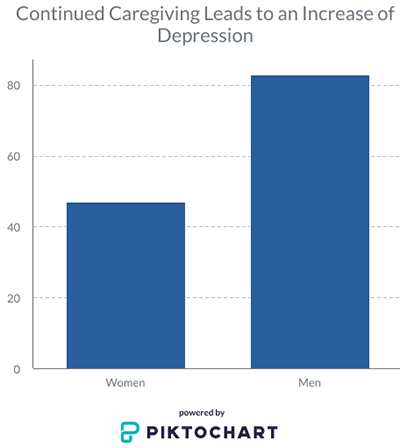Challenges arise as one helps aging family members. How do you cope with a life’s worth of interactions when making difficult decisions?
Stress and Guilt Facts
Adult children become an increasingly important source of informal care as:
- The baby boomer generation ages and may need additional care.
- Families move to different states and there may be fewer family members who can assist.
- Divorce increases.
- The life expectancy difference between men and women results in a larger number of elderly widows.
For additional information on this topic, go to Granddaughter and Primary Care Physician interviews on this website.

Increased Depression, by gender
Research on the mental and physical health effects of caregiving on adult children suggests:
- Care of frail older adults can lead to significant consequences for caregivers’ mental health. Caregivers score higher than non-caregivers regarding symptoms such as burden, stress, depression, anger, anxiety, and guilt.
- Feelings of guilt significantly related to caregiver distress.
- Caregivers often feel guilty if they feel relief after the patient dies.
Tips on reducing stress and guilt:
Do not aim for guilt-free caregiving. Our species carry guilt in our DNA as a group survival mechanism. What you think you “should do” versus what you “can do” may cause guilt. Work on forgiving yourself and consider working with a professional therapist.
We can not always rescue others. Caregivers often cannot provide complete relief or cure. Perfect outcomes are impossible. Hold yourself to realistic goals.
Maintain balance. Taking breaks from caregiving may bring up feelings of guilt; however, breaks are necessary for your emotional health. If you feel the caregiver role is taking a toll on your quality of life, seek a therapist with whom you can work through emotions and process personal expectations.
Tolerate ambivalence. Negative feelings such as resentment, anger, or sadness are part of normal family life. Caregiving does not make you an angel. You may have mixed feelings some days which makes you human.
Find other motivations. Guilt may lead you to do things you do not want to do. You then may become resentful. Act on more noble impulses; provide care because you consider it important.
Accept help. Prepare a general list of ways others can help you. Let the helper decide what he or she would like to do.
Focus on what you can provide. It’s normal to feel guilty sometimes. No one is a “perfect” caregiver. Remember, you are doing the best you can. Make the best decisions you can at any given time.
Set realistic goals. Break large tasks into smaller steps. Prioritize, establish a daily routine, and make lists. Avoid time-consuming requests, such as hosting large family events. Set realistic goals within caregiving role and outside caregiving responsibilities.
Join a support group. A support group can provide encouragement, validation, and problem-solving strategies for difficult situations. Others in support groups will likely empathize. A support group can offer an excellent opportunity to foster friendships.
Set personal health goals. Set goals for a healthy diet, find time to be active, establish a good sleep routine, and drink plenty of water.
See your doctor. Prioritize your yearly physical to ensure you are benefiting from recommended vaccinations and screenings. Tell your doctor about your caregiver role and bring with you a list of concerns or symptoms.
Tips on Minimizing Conflict
Foster Open Communication
Long before aging parents need care, all family members must discuss how caregiving may unfold. Who are the parents hoping will step in, and how? What roles does each adult child envision for themselves? Be aware of mismatches among expectations and work them through. Consider all family members’ needs when creating a caregiver plan.
For additional information on this topic, go to Lawyer interview on this website.
Manage Expectations
Your ultimate responsibility to an aging parent is not necessarily to care for them in the exact manner they prefer but to ensure that they are cared for in a sustainable way. Perhaps a sibling, other than the parent’s favorite, is the primary caregiver or that the siblings switch roles among themselves over time as their life circumstances change.
For additional information on this topic, go to Emotional Distance and Physical Distance interviews on this website.
Citations
Coe, N.B. & Van Houtven, C.H. (2009). Caring for Mom and Neglecting Yourself? The Health Effects of Caring for An Elderly Parent. Health Economics, 18: 991-1010.
Losada, A., Marquez-Gonzalez, M., Penacoba, C. & Romero-Moreno, R. (2010). Development and Validation of the Caregiver Guilt Questionnaire. International Psychogeriatrics, 22:4, 650-660.
https://www.mayoclinic.org/healthy-lifestyle/stress-management/in-depth/caregiver-stress/art-20044784
https://www.aarp.org/caregiving/life-balance/info-2017/living-with-guilt-bjj.html